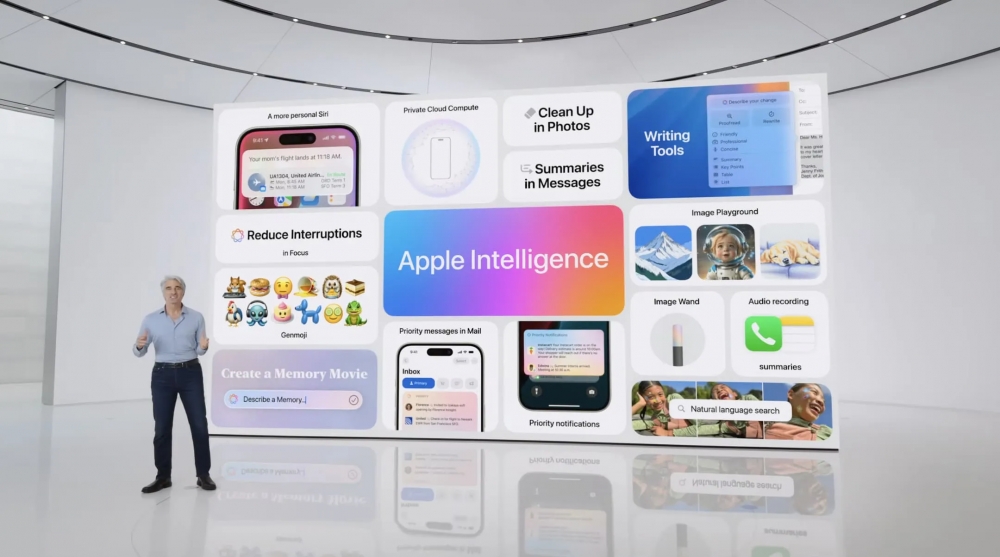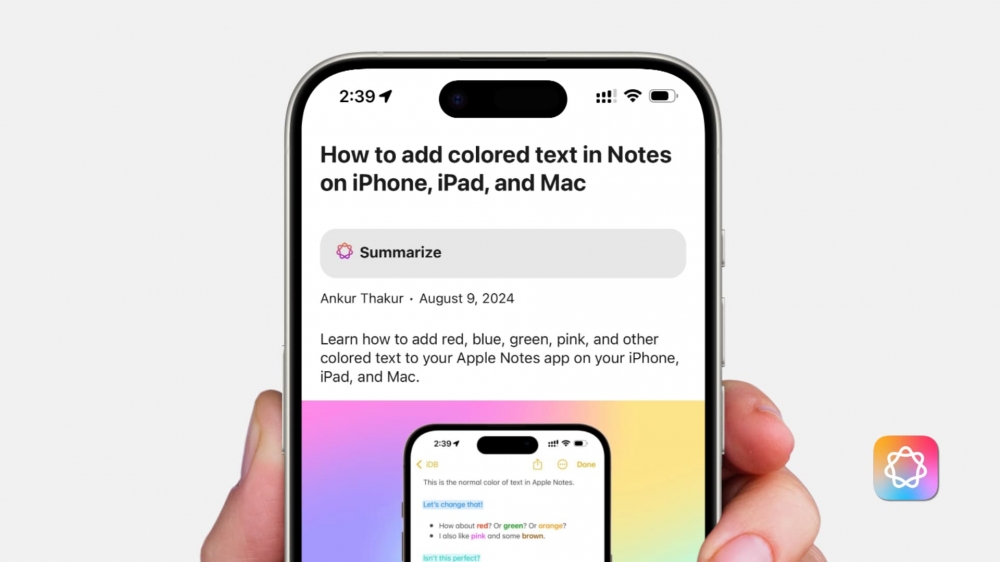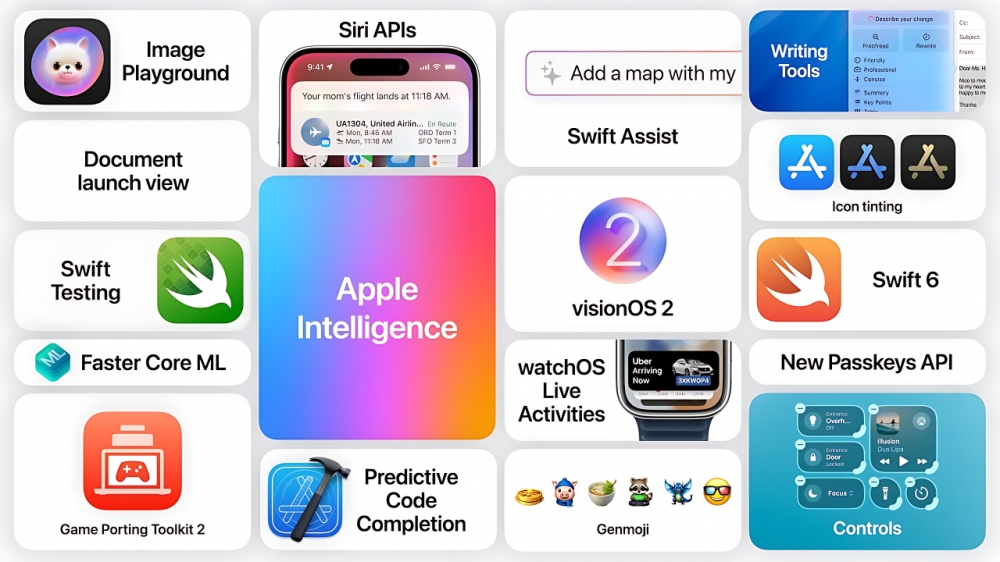Apple Intelligence Launch Timeline: When Will Apple's AI Features Actually Arrive?
- Apple’s AI is about to change your iPhone, but don't expect it overnight.
- Siri is about to get way more useful—just not until 2025.
- iPhone 16 is ready for Apple’s new AI... if you can handle the wait.
- Some of the coolest iOS 18 features? They're still months away.
At last week’s highly anticipated Glowtime launch event, Apple officially announced that iOS 18 will be available to the public on Monday, September 16. However, while the release will bring a range of new features, some of the most exciting AI-powered functionalities, known as Apple Intelligence, won’t arrive until iOS 18.1, which is slated for an October release.
 Photo via Apple Inc. // Craig Federighi introducing Apple Intelligence at WWDC24
Apple Intelligence is set to revolutionize how users interact with their iPhones, but for those eager to try it out, there’s a catch: the features will only be available on the iPhone 15 Pro and 15 Pro Max, along with the upcoming iPhone 16 series. The device language and Siri must be set to U.S. English. As you can see, Apple has included a lot of caveats with the initial rollout of “AI for the rest of us.”
Photo via Apple Inc. // Craig Federighi introducing Apple Intelligence at WWDC24
Apple Intelligence is set to revolutionize how users interact with their iPhones, but for those eager to try it out, there’s a catch: the features will only be available on the iPhone 15 Pro and 15 Pro Max, along with the upcoming iPhone 16 series. The device language and Siri must be set to U.S. English. As you can see, Apple has included a lot of caveats with the initial rollout of “AI for the rest of us.”
Timeline of Key Apple Intelligence Updates
While much of Apple's roadmap for the full rollout remains under wraps, some crucial details have emerged through public beta releases, leaks, and reports from sources like MacRumors, 9to5Mac and others. Here’s a breakdown of the upcoming features expected across the next several iOS updates:
iOS 18.1 – Coming in October 2024
The first major AI enhancements will arrive with iOS 18.1. Apple has made some significant promises regarding improvements to Siri during the WWDC 2024, including its ability to better understand follow-up requests and offer context-aware responses.
In our early tests with the developer beta, Siri's handling of queries, especially for tasks like checking stock prices or football lineups, was still lacking. However, with time to improve, it’s hoped that ChatGPT’s integration will fill in some of these gaps once it rolls out in later updates.
Other AI-powered functionalities expected with iOS 18.1 include:
- Notification summaries for apps like Messages and Mail
- Suggested replies to emails and texts
- A new writing tool to proofread, summarize, and rewrite text for different audiences
- An AI-powered “Clean Up” photo editor, akin to Android’s Magic Eraser
- Phone call transcriptions and recording capabilities
- The ability to create a Memories movie from Photos using just a typed description
- Focus Mode: Reduce Interruptions, which prioritizes urgent notifications
 Photo via iDownloadBlog // Apple Intelligence will introduce AI-powered summaries for emails and messages, making communication faster and more efficient.
Photo via iDownloadBlog // Apple Intelligence will introduce AI-powered summaries for emails and messages, making communication faster and more efficient.
iOS 18.2 – Expected in December 2024
Mark Gurman of Bloomberg has reported that iOS 18.2 will bring two highly anticipated AI features:
- Image Playground: A groundbreaking tool that allows users to generate images by describing them to Siri or through preset concepts.
- Genmoji: A fun AI-powered emoji generator that creates custom emojis based on descriptions or photos in your library.
 Photo via Apple Inc. // Apple Intelligence Image Playgrounds running on an Apple iPad Pro.
Photo via Apple Inc. // Apple Intelligence Image Playgrounds running on an Apple iPad Pro.
Additionally, this update is expected to expand Apple Intelligence to more English-speaking countries, including Australia, Canada, New Zealand, South Africa, and the U.K. for the first time.
iOS 18.3 – Early 2025
iOS 18.3 is shaping up to be a relatively minor update. While there is little clarity on whether new AI features will be added, this version is expected to fine-tune the existing functionality introduced in the earlier updates. Given the timing, it could arrive just after the U.S. holiday season.
iOS 18.4 – March 2025
Perhaps the most exciting updates are planned for iOS 18.4, which will bring further improvements to Siri. By this point, Siri is expected to become much more contextually aware and offer personalized responses based on what’s happening on-screen and in your apps.
Additionally, Siri will gain new per-app controls, allowing users more fine-grained customization of their interactions with the assistant. These improvements will also likely be accompanied by an expansion of Apple Intelligence to non-English languages, potentially including Chinese, Japanese, French, and Spanish.
A Long Wait for Full AI Integration
It’s clear that Apple has a grand vision for the future of iPhone interaction through Apple Intelligence. However, for buyers of the iPhone 16, the delay in full AI functionality might be a source of frustration. As one observer put it, "It’s almost comical that Apple will take more than a year to bring the full Apple Intelligence experience to the iPhone 16, despite claiming that the phones are built for AI."
Nonetheless, Apple seems intent on perfecting these features rather than releasing them prematurely. As we edge toward 2025, it will be intriguing to see just how transformative these AI tools become, especially for users who rely on Siri daily.
 Photo via Apple Inc. // Apple's iPhone 16 lineup, as well as iPhone 15 Pro and 15 Pro Max, are expected to showcase new AI features in 2024 and 2025.
Photo via Apple Inc. // Apple's iPhone 16 lineup, as well as iPhone 15 Pro and 15 Pro Max, are expected to showcase new AI features in 2024 and 2025.
What’s Next for Apple Intelligence?
With Siri’s AI upgrades being delayed until March 2025, it’s safe to say that Apple’s push into artificial intelligence is a long-term commitment. Whether it’s on-screen awareness, personal context for responses, or the ability to create and edit content using AI, the company is taking significant steps to redefine how we interact with our devices.
However, many questions remain. How smoothly will these features integrate into daily life? And will Apple be able to outpace its competitors in the rapidly evolving AI landscape?
For now, Apple fans can only wait and see.
Recommended by the editors:
Thank you for visiting Apple Scoop! As a dedicated independent news organization, we strive to deliver the latest updates and in-depth journalism on everything Apple. Have insights or thoughts to share? Drop a comment below—our team actively engages with and responds to our community. Return to the home page.Published to Apple Scoop on 15th September, 2024.
No password required
A confirmation request will be delivered to the email address you provide. Once confirmed, your comment will be published. It's as simple as two clicks.
Your email address will not be published publicly. Additionally, we will not send you marketing emails unless you opt-in.